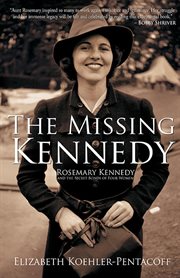The ambassador Joseph P. Kennedy at the Court of St. James's 1938-1940
Book - 2021
"Acclaimed biographer Susan Ronald reveals the truth about Joseph P. Kennedy's shockingly controversial tenure as Ambassador to Great Britain on the eve of World War II. On February 18, 1938, Joseph P. Kennedy was sworn in as US Ambassador to the Court of St. James. To say his appointment to the most prestigious and strategic diplomatic post in the world shocked the Establishment was an understatement: known for his profound Irish roots and staunch Catholicism, not to mention his "plain-spoken" opinions and womanizing, he was a curious choice as Europe hurtled toward war. Initially welcomed by the British, in less than two short years Kennedy was loathed by the White House, the State Department and the British Government.... Believing firmly that Fascism was the inevitable wave of the future, he consistently misrepresented official US foreign policy internationally as well as direct instructions from FDR himself. The Americans were the first to disown him and the British and the Nazis used Kennedy to their own ends. Through meticulous research and many newly available sources, Ronald confirms in impressive detail what has long been believed by many: that Kennedy was a Fascist sympathizer and an anti-Semite whose only loyalty was to his family's advancement. She also reveals the ambitions of the Kennedy dynasty during this period abroad, as they sought to enter the world of high society London and establish themselves as America's first family. Thorough and utterly readable, The Ambassador explores a darker side of the Kennedy patriarch in an account sure to generate attention and controversy"--
| Location | Call Number | Status | |
|---|---|---|---|
| 2nd Floor | BIOGRAPHY/Kennedy, Joseph P. | Withdrawn |
- Subjects
- Genres
- Biographies
- Published
-
New York :
St. Martin's Press
2021.
- Language
- English
- Main Author
- Edition
- First edition
- Physical Description
- xxi, 441 pages, 8 unnumbered pages of plates : illustrations, genealogical tables ; 25 cm
- Bibliography
- Includes bibliographical references (pages 379-426) and index.
- ISBN
- 9781250238726
- Joseph Patrick Kennedy Family Tree
- Note on Names and Spelling
- Prologue
- Part I. The Winters of Our Discontent
- 1. The President's Man
- 2. An Imperfect Family Portrait
- 3. The Presidential Envoy
- 4. The Importance of being Catholic
- 5. Project Kennedy
- 6. "The Loaded Pause"
- 7. The Movie Mogul and the Trade Deal
- 8. The Last Family Christmas
- Part II. Sunshine at the Court of St. James's
- 9. The Celebrity Ambassador
- 10. Hitting the Ground Running
- 11. "Spring Manoeuvres"
- 12. The Pilgrims
- 13. The English Swans
- 14. Trading Insults
- 15. The Emerald Isle and "Case Green"
- 16. To Be Or Not To Be - President
- 17. Return to Albion
- 18. A French Interlude
- Part III. Sunset and "The Gathering Storm"
- 19. The "Faraway Country"
- 20. Trafalgar Day
- 21. The Ambassador and the Jews
- 22. A Welter of Ruffled Feathers
- 23. A Coronation to Remember
- 24. "A Wave of Perverse Optimism"
- 25. The Last Season
- 26. This Country is at War with Germany"
- Part IV. Into the Darkness
- 27. Sinking the SS Athenia
- 28. "Depressed Beyond Words"
- 29. "Beware the Bear"
- 30. Shadowing Welles
- 31. Kennedy and the "King's Weather"
- 32. A Treacherous Friend
- 33. "Jittery Joe"
- 34. Come Hell or High Water
- 35. The Dragon Slayers
- Epilogue
- Author's Note and Acknowledgments
- Dramatis Personae
- Notes
- Selected Bibliography
- Index
Review by Publisher's Weekly Review
Review by Library Journal Review
Review by Kirkus Book Review

